After World War I ended and Poland regained its independence, representatives of the government, as well as scientific and technical communities, started to postulate the necessity to create uniform guidelines for the purposes of technical acceptance in certain government departments. Efforts to organize the activity of standardizers took a few years and ended in 1923 with establishment of the Technical Committee for the Standardization of Industrial Products and Their Delivery.
The main guiding spirit of the Committee's creation was Piotr Drzewiecki, Eng.: the first mayor of Warsaw in the Second Polish Republic, head of Polish Municipal Bank, chairperson of the Management Board of the Association of Polish Cities, president of the Association of Polish Technicians, and finally, the first president of the Polish Committee for Standardization. The first meeting of the Committee took place in 1924 and it was when the name of Polski Komitet Normalizacyjny [Polish Committee for Standardization], P.K.N. (as the shortened name was written at that time) was adopted—therefore, 1924 is the officially recognized date of PKN's foundation.
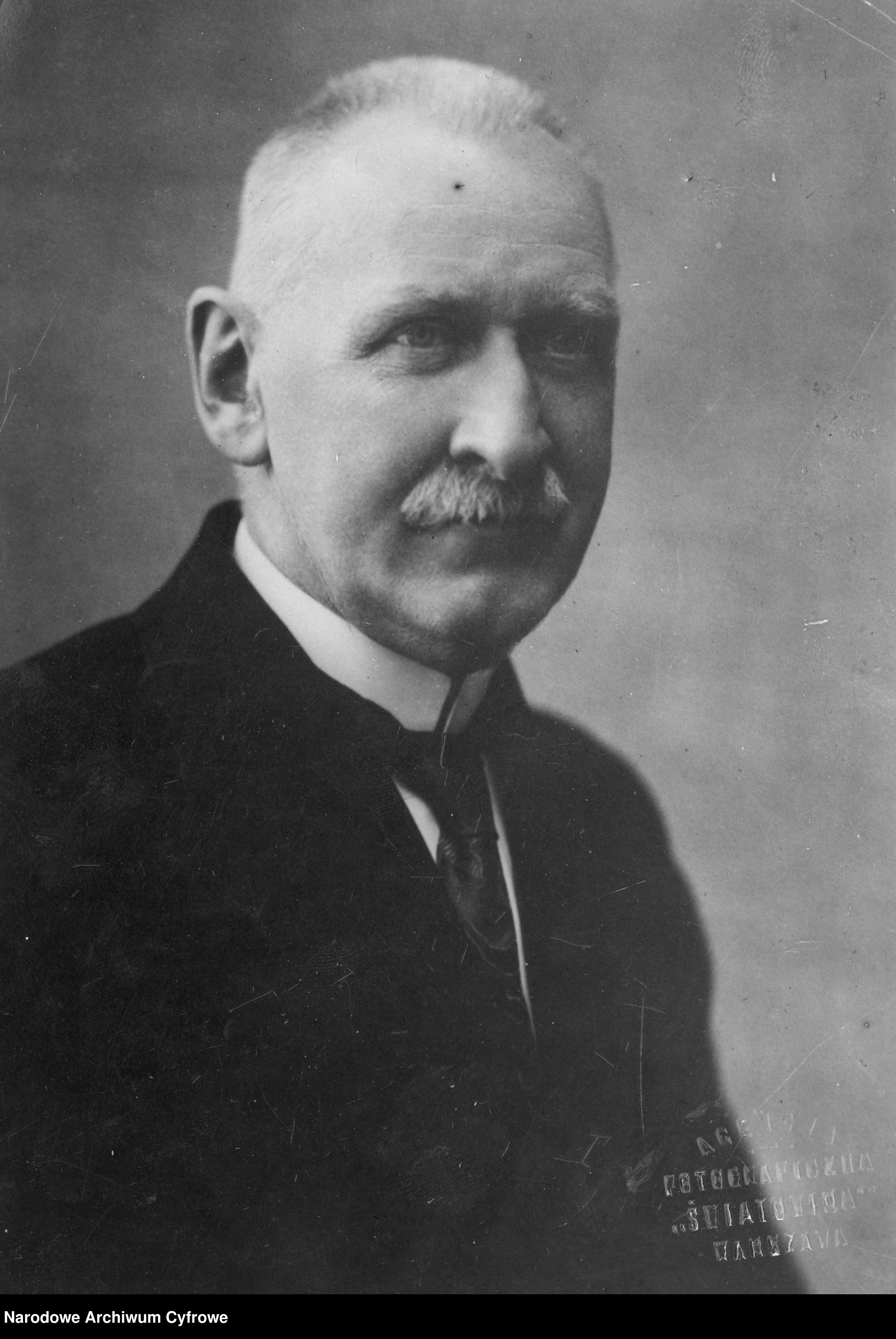
The first Polish Standards
In the interwar period, the PKN developed 1,698 Polish Standards (PN). At the time, Poland could be proud of exceptional pioneer standards that concerned: Renard numbers, technical drawing, units of measurement, material resistance, and diameter fitting. With the last one, the most important role was played by Prof. Henryk Mierzejewski, Eng.—the founder and first president of the Polish Association of Mechanical Engineers and Technicians (SIMP). He actively participated in creating the Polish Committee for Standardization and trained wonderful standardizers. In 1925, the first Polish Standard, which regarded reference temperature, was published.
Nowadays, development of standards is an entirely electronic process that allows us to create products and services in accordance with the clients’ needs.

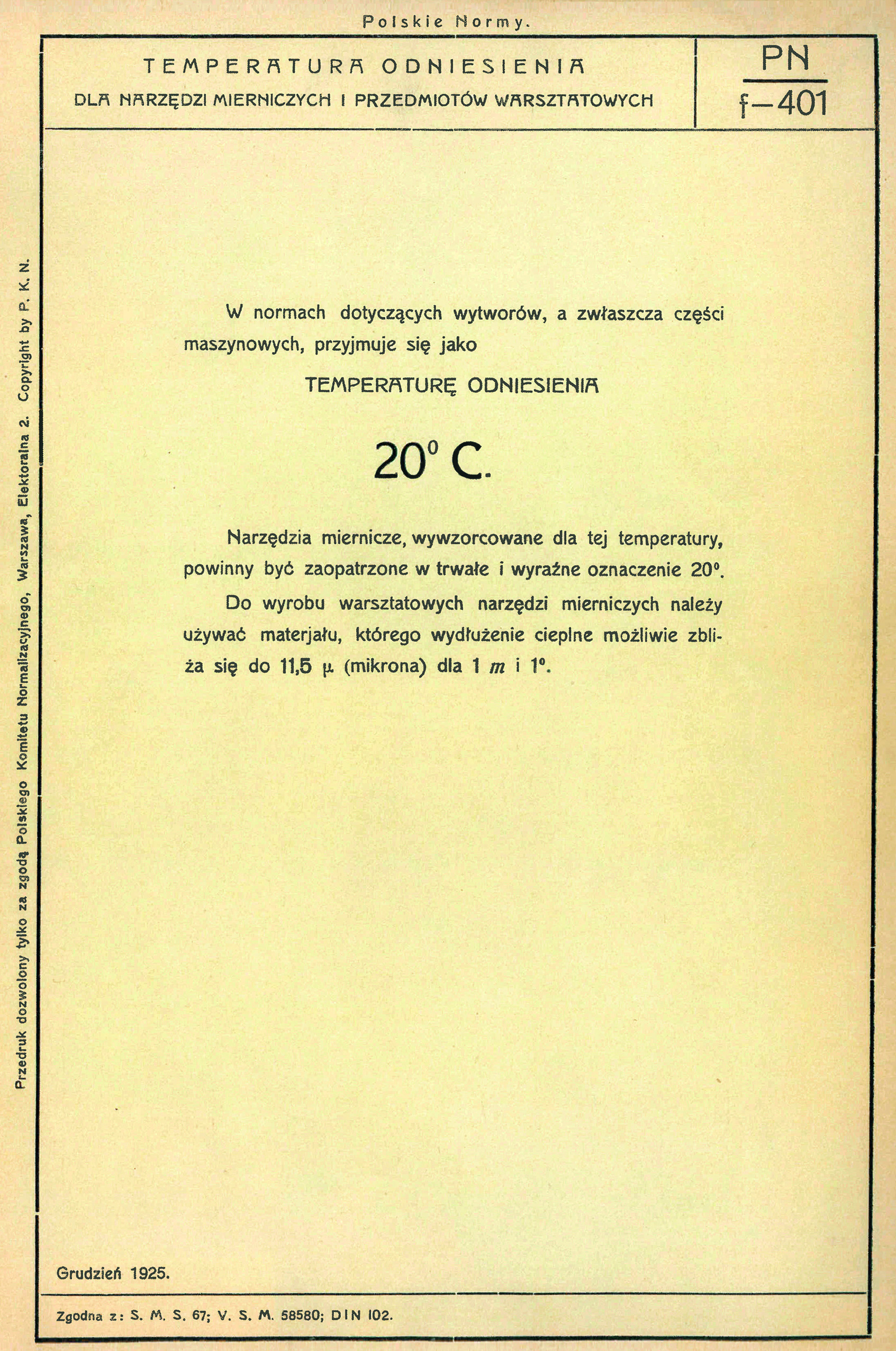
The first issue of Wiadomości Polskiego Komitetu Normalizacyjnego
A magazine of the Polish Committee for Standardization was first published on 7 January 1925 as an add-on to the Przegląd Techniczny engineering magazine, under the name of Wiadomości Polskiego Komitetu Normalizacyjnego [News of the Polish Committee for Standardization]. In 1930, it became an independent magazine with the same title. In the years 1930–1939, the magazine mainly published news about work carried out by P.K.N. and its committees; the articles included, among other things, drafts of Polish Standards, lists of adopted, published or withdrawn standards, lists of amendments to standards, and lists of foreign standards. The publishing of the magazine, interrupted by World War II, was resumed in 1947—the magazine was given a new, shortened name of Wiadomości PKN [News of PKN].
In 1953, PKN started publishing the PKN's Newsletter which included official news and orders of the President of PKN. In 1955, Wiadomości PKN was reshaped into a scientific and technical monthly magazine Normalizacja [Standardization]. Since 2008, it has been published as Wiadomości PKN. Normalizacja [News of PKN: Standardization]. Currently, the magazine is published in electronic form on the PKN's website (starting from issue No 9/2011).
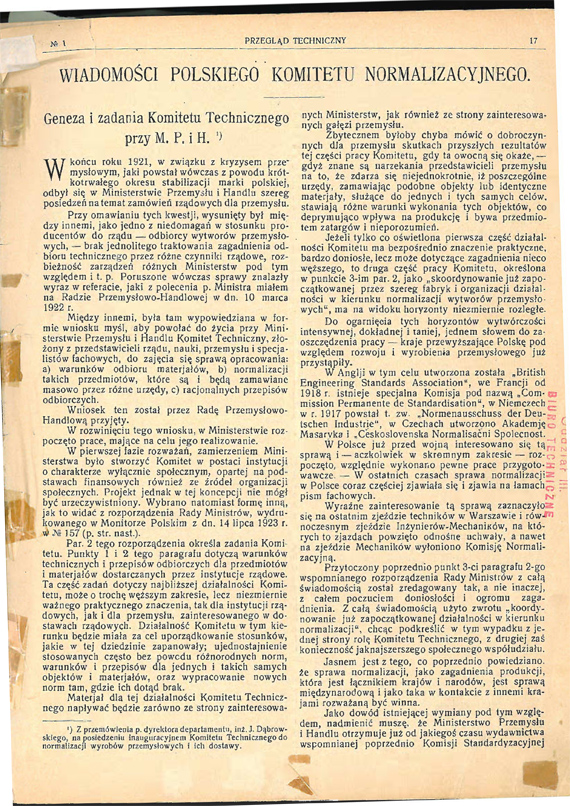

In December 1939, the Nazi authorities offered cooperation to PKN with regard to standardization. The president, Piotr Drzewiecki, firmly declined the offer. In March 1940, the Nazi authorities organized a conference on the liquidation of institutions unnecessary for the General Government. The decision on the liquidation of PKN was to be made by a selected official. PKN's employee, Feliks Jasiński, was summoned twice to testify on PKN, in June 1940 and in December 1943.
However, the Polish Committee for Standardization was never liquidated. Yet, this does not mean that all of PKN's actions were accepted by the occupier. The development of new standards and the work of the standardization committees were carried out in secret. Materials for the committees were provided by students and pupils from vocational schools.
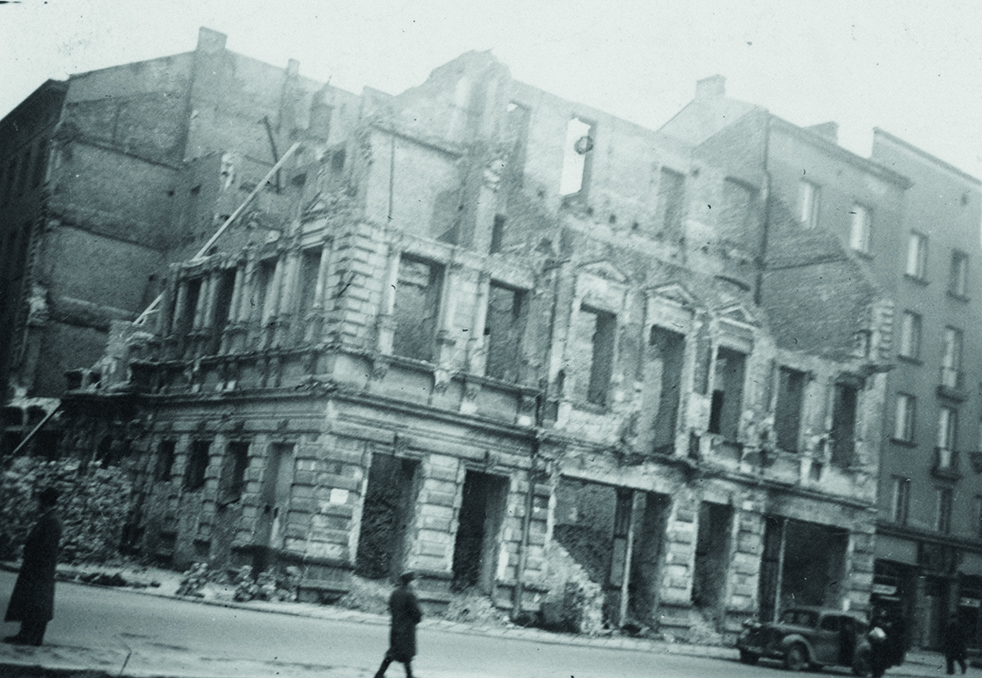
Czesław Szczekowski, Eng. was appointed as the General Secretary. Szczekowski made contact with former standardizers from the Ministry of Culture and Ministry of Military Affairs and with the Association of Polish Electricians. As the end of the war could be sensed in 1944, standardization committees essential for the rebuilding of the country were motivated to carry out strenuous work, inter alia the standardization committee on construction which was created in 1941 and led by Prof. Wacław Żenczykowski. Unfortunately, a part of the materials was destroyed during the Warsaw Uprising. Some of the studies from the period of resistance activities were used as an initial material for PKN which was re-opened after the war. An enormous collection of pre-war standards, a library and archives of a total value of 1,500,000 pre-war Polish zloty was destroyed (burnt) in January 1945 by the occupiers before their retreat from Warsaw. Janina Jasińska (wife of one of employees of PKN at the time) collected those of Polish Standards that survived the fire and hid them in the basement of her house at ul. Narbutta 27-A. After the war, she gave them to the Ministry of Industry and Trade.

In 1946, 65 delegates from 25 countries met in London to discuss the future of international standardization. In 1947, the International Organization for Standardization (ISO) was officially created, with 67 technical committees (expert groups carried out works within the specified range of topics).The Polish Committee for Standardization was one of the founding members.
PKN actively promotes the international standardization activities, implements ISO documentation, and participates in technical work. Since 1960, it has run the secretariat of ISO/TC 98 Bases for design of structures, and since 1980 – ISO/TC 98/SC 2 Bases for design of structures. Reliability of structures.


In 1950, PKN took over duties of the national Electric Engineering Committee and, as a result, a membership in the International Electrotechnical Commission (IEC). The IEC is the first global standardization organization. It was founded due to the rapid growth of the electrotechnical engineering industry at the beginning of the 20th century. Its tasks regarded the homogenization of parameters of produced electricity, as well as of products that used it. The Polish National Electrical Engineering Committee has been operating within the IEC without interruptions since 1923. It is worth emphasising that PKN has been running the secretariat for IEC/TC 27 Industrial electroheating and electromagnetic processing since 1960.
In the period of the Polish People's Republic, nationwide standardization consultations were organized. Their aim was to increase the interest of technical societies and government authorities in the standardization. The first consultation took place in Warsaw in June 1954. Conclusions from the consultations helped develop the first five-year standardization work program. In addition, the need to create a specialist position of a standardizer was noticed, therefore, the appropriate courses were organized.
On 27 November 1961, the Standardization Act was adopted. It was repealed only in 1994 and introduced the division of standards into: Polish Standards (PN), industry standards (BN), and factory standards (NZ). It also increased penalties for failure to observe national standards (PN and BN). Pursuant to Article 15, a basic penalty for the failure to observe the standards was 3 months of imprisonment or a fine of PLN 4,500, which in 1961 was equal to approx. 1,285 kg of wheat bread. Yet, the penalty could be increased if life and health exposure to danger or the occurrence of “major damage to the economic interests of the State” was discovered. The defendant was subject to the punishment of up to three years if wilful misconduct was identified. In the case of unintentional actions, the defendant was subject to the punishment of up to 6 months of imprisonment or a fine of PLN 10,000.
Following various organizational changes and mergers: in 1972 with metrology, when the Polish Committee for Standardization and Measurement Units (PKNiM) was created, and in 1979 with quality, after the creation of the Polish Committee for Standardization, Measurement Units and Quality (PKNMiJ), since 1 January 1994, by the Standardization Act of 3 April 1993 – the Polish Committee for Standardization returned to its original shape. Provisions of the Act brought back the freedom of use of Polish Standards with some exceptions—standards referred to in regulations were mandatory.
PKN, as a signatory to the agreement with the European Telecommunications Standards Institute (ETSI), gained a position of a national standardization organization (ETSI/NSO).
The Act of 13 October 2000 allowed for the introduction of European Standards and International Standards to national standards in the original language. Thanks to that, the pace of the process of implementation of European Standards to the collection of PNs increased significantly. That allowed PKN to apply for membership in the European Committee for Standardization (CEN) and European Committee for Electrotechnical Standardization (CENELEC).
On 12 September, the Standardization Act was adopted and it has remained in force to this day. The Act mainly introduced absolute freedom in the application of standards, allowing to refer to Polish Standards in legal provisions without changing their status of voluntary use. It also allowed to develop other standardization documents used in worldwide standardization, such as Technical Reports and Technical Specifications.
On 1 January 2004, PKN became a member of the CEN and CENELEC. Becoming a member was one of the criteria for Poland to access the European Union, what required the adjustment of the national standardization system to the European standardization system. Since then, Polish stakeholders can fully participate in the development of European Standards and thereby have an influence over the forming of the Single Market. It’s been 20 years!
The Polish Standardization Day (DNP) was established in 2010. It is an opportunity to promote the idea of voluntary standardization and underline benefits resulting from the application of standards. Moreover, it is the manner of honouring all the people and entities actively participating in Polish standardization, including, among others, government administration authorities, economic organizations, as well as representatives of the scientific and technological communities.
The Polish Committee for Standardization popularizes the knowledge of standardization within the new generation. In 2011, PKN introduced the Educational Policy intended for higher education institutions, and in 2012—for secondary schools. It was also when PKN launched the annual National Competition "Standardization and Me" for secondary school students and teachers. Each edition regards different topics within the context of standardization.
As of today, over 1,400 students have taken part in standardization competitions organized by PKN. PKN encourages the use of the knowledge of standardization in everyday practice and teaching, i.e. to use verified, the best, and always up-to-date solutions contained in Polish Standards. It promotes the idea that it is worth having an influence over the content of standards, as it is reflected in tangible economic benefits for participants of the standardization system.
Today, PKN cooperates with many higher education institutions and secondary schools. It supports bottom-up initiatives and regional standardization competitions, and meets with young people and talks about standardization.
PKN initiated awarding individuals or companies that provided significant support to the standardization system.
Standardization Compass: the award given to natural persons, legal persons, and organizational units in recognition of their achievements in supporting standardization, including, among other things, involvement in the promotion of standardization or a special contribution to the promotion of the voluntary standardization system.
Promoter of Education about Standardization: this honorary title is awarded to a person who supports education about standardization through political, organizational, promotional, and publishing activities. A person who contributes to the dissemination of knowledge of standardization and the promotion of standardization in education and actively participates in the process of implementing education about standardization into the teaching practices.
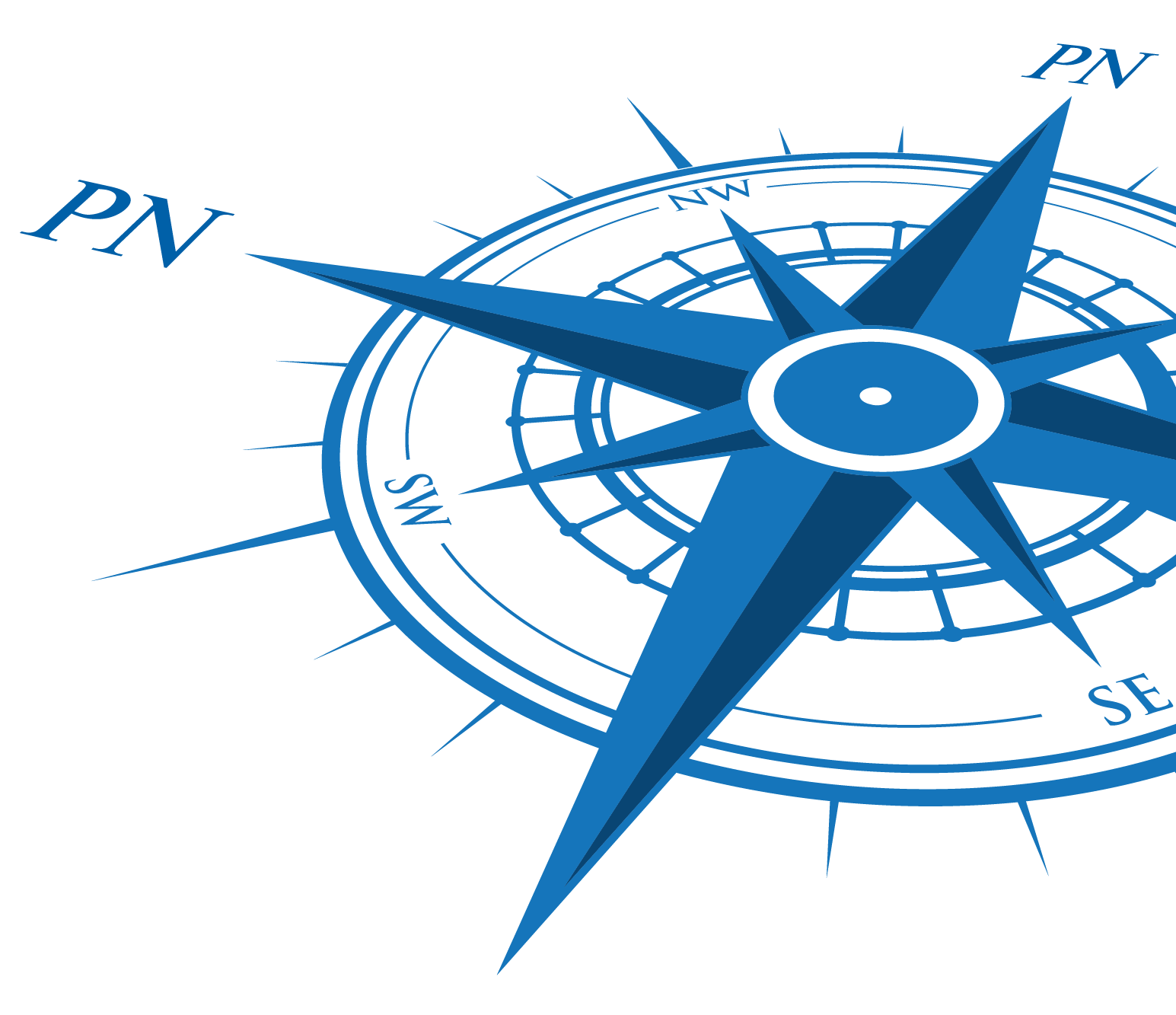
Thanks to PKN's efforts, standardization was included in new essential curriculum for occupations of vocational education by the Regulation of the Minister of National Education of 16 May 2019, Dz. U. [Polish Journal of Laws] of 2019, item 991.
This means that students of vocational schools will be familiarized with, among others, basic information regarding standards and standardization, and taught how to search standards and apply them in the conformity assessment. The new regulation includes solutions that correspond to actual needs of the labor market. Development and enhancement of education on standardization becomes more and more meaningful for teachers as well. Therefore, PKN conducts seminars on standardization for educators. Since 2019, almost 700 teachers have taken part in such seminars.
2024 is a special year for PKN: the national standardization body is 100 years old, while the system of voluntary standardization is 30 years old! Moreover, for 20 years now, PKN has been a member of European standardization organizations: CEN and CENELEC.
The Polish Committee for Standardization is not only the past and the present, but also the future we create together!
The essence of standardization of the 1920s is still valid today and in line with the current views. What is more, it is still open to the broadly-defined future. The contemporary standardization faces challenges regarding, among others, prevention of global warming, cybersecurity, sustained development, improvement of life quality, environment protection, and rapid technological progress related to artificial intelligence, hydrogen technologies, cybersecurity, and intelligent transportation systems. All of that drives standardization and makes the future still interesting. Nowadays, PKN cooperates with over 300 Technical Bodies (OT) in which over 1,000 companies and institutions operate, and the collection of Polish Standards includes over 80,000 standardization documents. Over the recent years, PKN has been changing and adapting to shifting conditions to be able to face current challenges. Thanks to that, we are a recognized partner in Poland and abroad.
PKN is not merely an institution, it is also the people who form it. Today, it consists of over 240 employees in Warsaw, Łódź, and Katowice, who are driven by the same purpose as 100 years ago and by their constant openness to novelty.